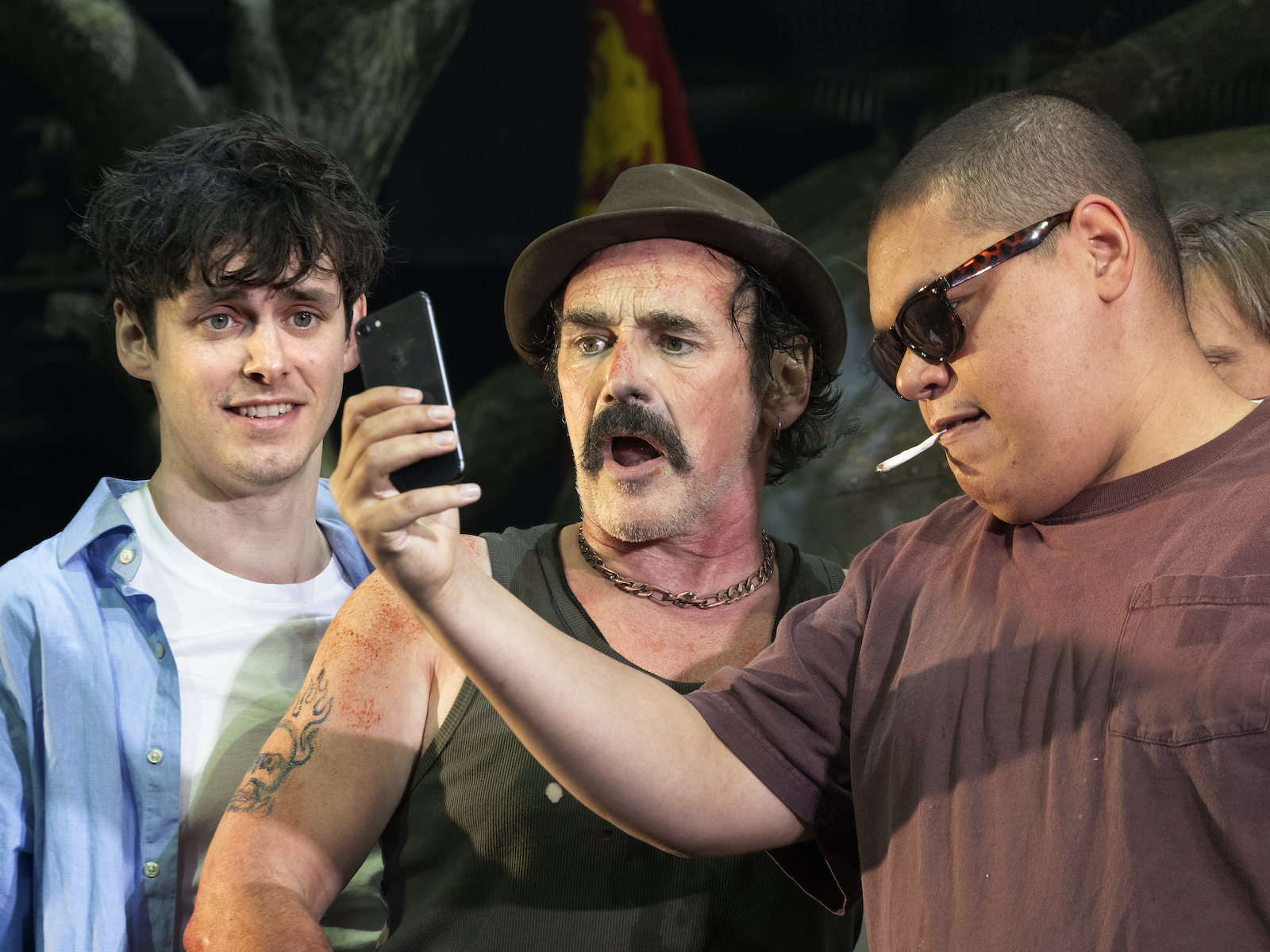Jerusalem, Apollo Theatre review - Mark Rylance blazes in this astonishing revival | reviews, news & interviews
Jerusalem, Apollo Theatre review - Mark Rylance blazes in this astonishing revival
Jerusalem, Apollo Theatre review - Mark Rylance blazes in this astonishing revival
Jez Butterworth's 2009 play is evergreen in its excellence

At long last, the giant has come back. Over a decade after its critical apotheosis on both sides of the Atlantic, Jez Butterworth’s Jerusalem returns to London in an astonishing revival starring Mark Rylance as the high priest of its proceedings. With the renewed intensity of its vision of an England in crisis, Butterworth’s infinitely rich play is proof that legends age well.
First staged at the Royal Court Theatre in 2009, Ian Rickson’s superbly calibrated production once again lures us into a world marked by its anarchic flair and supernatural rhythm. At its centre is Johnny “Rooster” Byron’s trailer home, permanently perched in a Wiltshire wood and frequented by his motley band of social outcasts. Hewing to classical unities, Butterworth has his drama revolve around this throbbing nucleus over the course of a single day, which happens to be St George’s Day. Witches, elves, and fairies may or may not be lurking in the shadows, but surely something is coming for Johnny. Ultz’s painterly set immerses us in the lush green of real trees and the steely hues of a wild assortment of junk. Even a quick glance at it is enough to register that the air is thick with birdsong and the smell of spring. With its near-mystical shafts, Mimi Jordan Sherin’s viscous lighting is almost out of a modern-day fairy tale. Aptly realised with painstaking detail, the play’s setting serves as the fulcrum of its central conflict – between Johnny and the council officials intent on evicting him from this copse.
Ultz’s painterly set immerses us in the lush green of real trees and the steely hues of a wild assortment of junk. Even a quick glance at it is enough to register that the air is thick with birdsong and the smell of spring. With its near-mystical shafts, Mimi Jordan Sherin’s viscous lighting is almost out of a modern-day fairy tale. Aptly realised with painstaking detail, the play’s setting serves as the fulcrum of its central conflict – between Johnny and the council officials intent on evicting him from this copse.
We are, after all, in holy land. Not necessarily the Jerusalem imagined upon England’s “green and pleasant land” in the popular hymn, but a site of profound personal rootedness. Rooster’s Wood is a social hub where Johnny and his on-and-off followers, both old and young, find their element: they horse around, take drugs, and recover from their hangovers. If the nearby country fair – complete with Morris dancing and a Queen of its own – is an annual ritual of civic life, then this fluid, unorthodox clan’s deeds in and around Johnny’s trailer are a set of daily rites that make them who they are.
Who, then, really owns this patch of green? Who can evict whom? Who gets to decide if Johnny, uncannily in sync with the ebb and flow of nature, is a disturbance for the residents of the neighbouring New Estate? These are among the questions that Butterworth’s drama leads us, with subtle but meticulous gestures, to ask of our own accord. With its beguiling mix of verbal registers, ranging from the occult to the colloquial, from the mock-epic to the Shakespearean, his juicy writing lends itself to intriguing accumulations of meaning. Pointing as they are to hefty ideas of nationalism, birthright and political dispossession, Jerusalem’s allegorical energies never detract from the compelling watch that it is.
Mark Rylance is crucial to all this, roaring through the larger-than-life role of Johnny, which has justly entrenched the actor’s name in theatre history. Limping with an affably cocky gait, he makes an unassuming but tantalising spectacle of Johnny’s verbal and social dexterities. His ripostes reveal an eerily agile mind, with more than one trick up his sleeve at any time. Beneath the jocular, though, there is also a deep-seated melancholy, which Rylance gradually, and beautifully, draws up to the surface. In his hands, this Falstaffian creature never ceases to surprise us. By the end, he seems to have ascended to a new spiritual plane, the growl of the earth itself rising from his chest. His is a blood-and-guts performance that is unflinching in its depth.
The rest of Butterworth’s colourfully off-kilter characters, too, are brought to life by a truly impressive cast. As Johnny’s long-term mate Ginger, Mackenzie Crook delicately straddles naivete and grit, making efficient use of his deadpan style. Alan David’s Professor and Gerard Horan’s Wesley are finely wrought portrayals that never miss their comedic marks. The younger members of Johnny’s crew are also on top form: Jack Riddiford is a marvel as the charmingly exasperated Lee, and Ed Kear brings a healthy dose of down-to-earth swagger to Davey (pictured above, Jack Riddiford, Mark Rylance and Ed Kear). Though she appears in one scene only, Indra Ové opens up a vital window into Johnny’s personal life as the mother of his six-year-old son.
Fortified with these commanding performances, Rickson’s masterful staging presents a succession of exquisite stage pictures that keep growing in their emotional power. The ways his actors move through the space speak volumes about the characters’ different levels of comfort near Johnny. Guided by the play’s epic spirit, Rickson can wring out complex, grand shades of meaning out of even the simplest of exchanges. Especially when tropes about English folklore come to the fore, his cunning treatment of the text reaches new heights: his direction unearths the fantastical in the everyday, and vice versa.
The intricate tapestry of Butterworth’s engrossing drama is the fabric that ties together these moments of unforgettable artistry. While Rylance’s blistering, guttural performance may be the centrepiece of Jerusalem, the production at large stands its ground with formidable rigour. Towards its close, Johnny delivers a bewitching list of all the “strange things” he’s witnessed in this wood over the years. He has seen, he says, “a rainbow hit the earth and set fire to the ground.” That image, we find out, also captures what Jerusalem does in the Apollo Theatre.
The future of Arts Journalism
You can stop theartsdesk.com closing!
We urgently need financing to survive. Our fundraising drive has thus far raised £49,000 but we need to reach £100,000 or we will be forced to close. Please contribute here: https://gofund.me/c3f6033d
And if you can forward this information to anyone who might assist, we’d be grateful.

Subscribe to theartsdesk.com
Thank you for continuing to read our work on theartsdesk.com. For unlimited access to every article in its entirety, including our archive of more than 15,000 pieces, we're asking for £5 per month or £40 per year. We feel it's a very good deal, and hope you do too.
To take a subscription now simply click here.
And if you're looking for that extra gift for a friend or family member, why not treat them to a theartsdesk.com gift subscription?
more Theatre
 That Bastard, Puccini!, Park Theatre review - inventive comic staging of the battle of the Bohèmes
James Inverne enjoyably reconstructs the rivalry between Puccini and Leoncavallo
That Bastard, Puccini!, Park Theatre review - inventive comic staging of the battle of the Bohèmes
James Inverne enjoyably reconstructs the rivalry between Puccini and Leoncavallo
 Till the Stars Come Down, Theatre Royal Haymarket review - a family hilariously and tragically at war
Beth Steel makes a stirring West End debut with her poignant play for today
Till the Stars Come Down, Theatre Royal Haymarket review - a family hilariously and tragically at war
Beth Steel makes a stirring West End debut with her poignant play for today
 Nye, National Theatre review - Michael Sheen's full-blooded Bevan returns to the Olivier
Revisiting Tim Price's dream-set account of the founder of the health service
Nye, National Theatre review - Michael Sheen's full-blooded Bevan returns to the Olivier
Revisiting Tim Price's dream-set account of the founder of the health service
 Girl From The North Country, Old Vic review - Dylan's songs fail to lift the mood
Fragmented, cliched story rescued by tremendous acting, singing and music
Girl From The North Country, Old Vic review - Dylan's songs fail to lift the mood
Fragmented, cliched story rescued by tremendous acting, singing and music
 The Merry Wives of Windsor, Shakespeare's Globe review - hedonistic fizz for a summer's evening
Emma Pallant and Katherine Pearce are formidable opponents to Falstaff's buffoonery
The Merry Wives of Windsor, Shakespeare's Globe review - hedonistic fizz for a summer's evening
Emma Pallant and Katherine Pearce are formidable opponents to Falstaff's buffoonery
 Run Sister Run, Arcola Theatre review - emphatic emotions, overwrought production
Chloë Moss’s latest play about the different lives of two sisters is deeply felt
Run Sister Run, Arcola Theatre review - emphatic emotions, overwrought production
Chloë Moss’s latest play about the different lives of two sisters is deeply felt
 Intimate Apparel, Donmar Warehouse review - stirring story of Black survival in 1905 New York
An early Lynn Nottage work gets a superb cast and production
Intimate Apparel, Donmar Warehouse review - stirring story of Black survival in 1905 New York
An early Lynn Nottage work gets a superb cast and production
 Hercules, Theatre Royal Drury Lane review - new Disney stage musical is no 'Lion King'
Big West End crowdpleaser lacks punch and poignancy with join-the-dots plotting and cookie-cutter characters
Hercules, Theatre Royal Drury Lane review - new Disney stage musical is no 'Lion King'
Big West End crowdpleaser lacks punch and poignancy with join-the-dots plotting and cookie-cutter characters
 Showmanism, Hampstead Theatre review - lip-synced investigation of words, theatricality and performance
Technically accomplished production with Dickie Beau never settles into a coherent whole
Showmanism, Hampstead Theatre review - lip-synced investigation of words, theatricality and performance
Technically accomplished production with Dickie Beau never settles into a coherent whole
 4.48 Psychosis, Royal Court review - powerful but déjà vu
Sarah Kane’s groundbreaking play gets a nostalgic anniversary reboot
4.48 Psychosis, Royal Court review - powerful but déjà vu
Sarah Kane’s groundbreaking play gets a nostalgic anniversary reboot
 Joyceana around Bloomsday, Dublin review - flawless adaptations of great dramatic writing
Chapters and scenes from 'Ulysses', 'Dubliners' and a children’s story vividly done
Joyceana around Bloomsday, Dublin review - flawless adaptations of great dramatic writing
Chapters and scenes from 'Ulysses', 'Dubliners' and a children’s story vividly done

Add comment